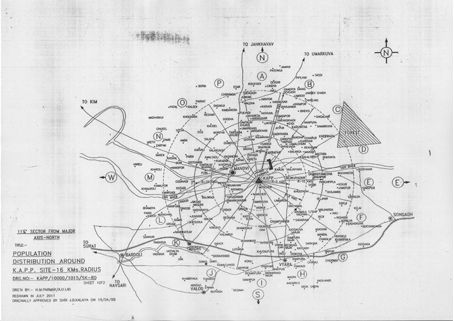Do’s and Don’ts pertaining to Nuclear Hazard 
|
| |
| |
The growth in the application of nuclear science and technology in the fields of power generation, medicine, industry, agriculture, research and defence has led to an increase in the risk of occurrence of Nuclear and Radiological emergencies. |
| |
Nuclear and Radiological Emergency/Disaster Scenarios |
| |
| • |
An accident taking place in any nuclear facility of the nuclear fuel cycle including the nuclear reactor, or in a facility using radioactive sources, leading to a large-scale release of radioactivity in the environment. |
| • |
A ‘criticality’ accident in a nuclear fuel cycle facility where an uncontrolled nuclear chain reaction takes place inadvertently leading to bursts of neutrons and gamma radiation (as had happened at Tokaimura, Japan). |
| • |
An accident during the transportation of radioactive material. |
| • |
The malevolent use of radioactive material as Radiological Dispersal Device (RDD) by terrorists for dispersing radioactive material in the environment. |
| • |
A large-scale nuclear disaster resulting from a nuclear weapon attack (as had happened at Hiroshima and Nagasaki in Japan) which would lead to mass casualties and destruction of large areas and properties. |
|
| • |
Nuclear facilities in India adopt internationally accepted guidelines for ensuring their safe operation and safety to the public and the environment. |
| • |
The Kakrapar Atomic Power Station (KAPS) is a nuclear power station, lies in the proximity of the Surat city in the State of Gujarat. It consists of two 220 MWe pressurized water reactors with heavy water as moderator and another two power station with the capacity of 700 MWe each is under construction. |
| • |
In addition, there are two heavy water plants situated in Gujarat (at Vadodara and Hazira). |
| • |
Area covering 16 Km radius around the plant is called the Emergency Planning Zone (EPZ) for preparation of emergency procedures and action plans. |
| • |
A total of 170 villages of district Surat and Tapi are located within EPZ. |
| |
 |
| |
| |
Important links for further information |
| |
|
| |
Nuclear Power Corporation of India Limited (NPCIL) |
| |
Department Of Atomic Energy (DAE) |
| |
Atomic Energy Regulatory Board (AERB) |
| |
International Atomic Energy Agency (IAEA) |
| • |
GSDMA Leaflets In Gujarati |